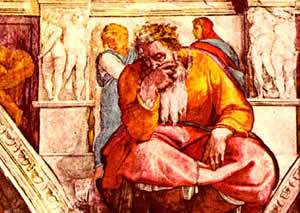Not Everything Turns Out Well
For Sunday January 31, 2010
Lectionary Readings (Revised Common Lectionary, Year C)
Jeremiah 1:4–10
Psalm 71:1–6
1 Corinthians 13:1–13
Luke 4:21–30
Three weeks ago I saw a movie that's created an Oscar buzz among critics. In Crazy Heart Jeff Bridges stars as Bad Blake, a country western music star who's fallen far over the hill. He's fifty-seven, drives a 1978 beater of a truck, and is playing gigs in bowling alley bars. "I used to be somebody," he sings, "but now I'm somebody else." Between stanzas he stumbles out the back stage door to puke in a bucket. The only question seems to be whether Blake will die of liver failure from liquor or of lung cancer from smoking. When asked where his many hit songs came from, he responds, "life, unfortunately."
Crazy Heart reminded me of The Wrestler, in which Mickey Rourke stars as Randy "The Ram" (Ram Jam!) Robinson, a professional wrestler twenty years past his prime. He can't pay the rent for his sleazy trailer and sleeps in his rusted van. Duct tape holds his coat together, steroids have bloated his body, chemicals turn his hair blond, and a hearing aid dangles from his ear. A stripper named Pam is Randy's only friend, and their mutual commiseration is touching.
 |
Bad Blake (Jeff Bridges). |
Bad choices and bad luck have landed Blake and The Ram in bad places. They're growing old, alone and fast. They're deeply estranged from their families, broke, and in broken health. But they soldier on, and so we resonate with them. When both films end, we wonder about the fate of Blake and Ram, and hope they'll be okay.
Bad Blake and The Ram embody many aspects of our own stories. They represent a truth that we know from experience but are tempted to deny as Christians — that many broken things cannot be fixed. But even a broken life can be a good life filled with God's presence. We can even say that God calls at least some of his saints to a life of brokenness.
As I walked home from watching Crazy Heart my mind wandered to a passage in Mary Gordon's new book Reading Jesus. In the enigmatic story about the withered fig tree, Jesus is hungry. He curses the fig tree for not bearing any fruit, even though it's not the season for fruit. It's as if he's angry at the tree for doing what nature dictates. There's no triumph of faith here, Gordon observes, and a hungry Jesus doesn't get what he wants. He stays hungry and he curses the tree.
"When we see Jesus cursing the fig tree," writes Gordon, "we observe him partaking of our despair over the death grip, the death sentence of causality. We must apprehend him here as a figure outside, past, the lines of good behavior. It is a narrative unfolding of what I believe to be one of the most important Gospel truths: that not everything turns out well."
The psalmist for this week worships God as his rock and fortress. He praises him for his mighty acts and marvelous deeds. But at the same time he laments the frailty of old age. He fears being forsaken and forgotten by God. He's wary of the wickedness and cruelty of humanity. He describes himself as a "portent to many" — a grotesque spectacle, sign of something ominous, or symbol of calamity. "You have made me see troubles," he prays to God, "many and bitter."
 |
"The Ram" (Mickey Rourke). |
Jeremiah's story begins with a divine call to forty years of faithful if reluctant ministry, but also forty years of deeply personal struggle for the man the church honors as the "weeping prophet." Jeremiah's troubles remind us that there is no call without conflict, and no divine summons without human struggle. In the words of the young and earnest priest in Georges Bernanos's Diary of a Country Priest, "We pay a heavy, very heavy price for the super-human dignity of our calling. The ridiculous is always so near to the sublime. And the world, usually so indulgent to foibles, hates ours instinctively."
Jeremiah protested his personal inadequacies. He struggled for forty years with a sense of failure, with virulent opposition from detractors, and with deep discouragement. He was beaten (20:2), received death threats (26:8), imprisoned (37:15), thrown down a well (38:6), and derided as an unpatriotic crank and traitor. The prophets, priests and kings dismissed him as seditious. God's call on his life made his heart break and his bones tremble (23:9).
God gave Jeremiah something more precious than a stoic exhortation to perseverance. He promised his divine presence. "Before I formed you in the womb I knew you, before you were born I set you apart; I appointed you a prophet to the nations. So do not be afraid, for I am with you" (1:4–10). This is the same comfort that the psalmist claimed: "From birth I have relied on you; you brought me forth from my mother's womb" (71:6). It's as if the resilience of even the most fragile life despite our brokenness is itself a miracle.
Believing this divine promise requires the audacity and courage to believe that God's presence gives perspective to all our problems. Conflict and brokenness are not inimical to God's call; sometimes they are part and parcel of it. The gospel for this week makes this point (Luke 4:21–30).
After demonic temptation in the lonely desert, Jesus began his public ministry by returning to Galilee. The stories about his words and deeds spread like wild fire. "Everyone praised him," writes Luke (4:15). In his home town of Nazareth, "all spoke well of him" (4:22). But these were the fickle praises of casual observers.
When the home town Jewish crowd asked for a sign of God's power, Jesus told two stories about how God extended his mercy to Gentiles — a widow in Zarephath in the region of Sidon, and Naaman the military commander of enemy Syria. And so "all the people in the synagogue were furious when they heard this. They got up, drove him out of the town, and took him to the brow of the hill on which the town was built, in order to throw him down the cliff."
 |
Jeremiah by Michelangelo (Sistine Chapel). |
Throughout his three-year ministry there's a tension between Jesus's obedience to his heavenly Father and his acceptance of the ways of the world. Eventually that obedience required a radical disruption, for by the time of his public ministry his own family tried to apprehend him as a crackpot, his own brothers did not believe in him, and others dismissed him as deranged, drunk, and demon-possessed (cf. Mark 3:21, John 7:5).
In his little book In the Name of Jesus about the three temptations of Jesus to be relevant, spectacular, and powerful, Henri Nouwen concludes with the words of Jesus to Peter in John 21:18: "When you were young you put on your belt and walked where you liked; but when you grow old you will stretch out your hands and somebody else will put a belt around you and take you where you would rather not go." This is Christian maturity, says Nouwen, the ability and willingness to relinquish power and control, and instead to be led where we'd rather not go — "to the unknown, the undesirable, and painful places."
For further reflection
Henry Vaughan (1621-1695)
The Revival
Unfold! Unfold! Take in His light,
Who makes thy cares more short than night.
The joys which with His day-star rise
He deals to all but drowsy eyes;
And, what the men of this world miss
Some drops and dews of future bliss.
Hark! How His winds have chang’d their note!
And with warm whispers call thee out;
The frosts are past, the storms are gone,
And backward life at last comes on.
The lofty groves in express joys
Reply unto the turtle’s voice;
And here in dust and dirt, O here
The lilies of His love appear!
Henry Vaughan, a Welsh poet and physician, was born in Llansanffraid, where he lived for most of his life and was eventually buried. Vaughan studied at Oxford, but never took a degree, and then moved to London where he studied law for two years. He underwent a spiritual awakening that he credited to the poetry of “the blessed man, Mr. George Herbert.” Vaughan was married twice and fathered eight children.
Image credits: (1) Imdb.com; (2) Media Lunch; and (3) AmericanPictures.com.





